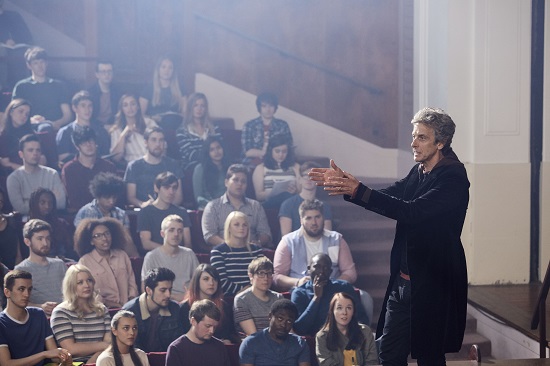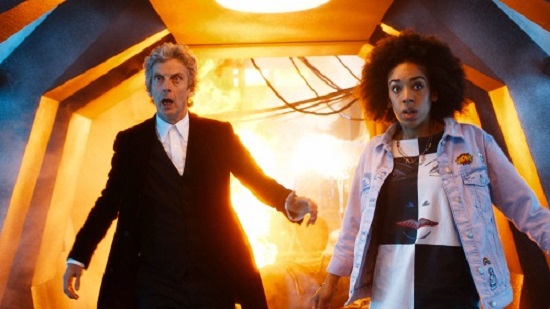The re-launched Doctor Who has now been running for thirteen consecutive years, which is nearly as long as the fifteen year hiatus from 1990 to 2004. There are now young adults who watched Christopher Eccleston and David Tennant’s Doctors as children, just as there are people in their seventies who watched William Hartnell and Partrick Troughton’s Doctors, just as there are new children watching Peter Capaldi’s. And a decent number of those young adults and septuagenarians still watch the show.
The audience for the show is increasingly global, too, currently broadcasting in over fifty countries, and firmly in the top five highest grossing titles for BBC Worldwide. It has a family audience, a sci-fi nerd audience, a casual audience, a gay audience, a Hawaiian audience and any other category you can think of. So making it for a target audience is now a clear impossibility.
Steven Moffat, now in his final season as showrunner, has never struck me as a man who loses his nerve. Indeed, given the exuberant public wanking session that was <a href=” http://thequietus.com/articles/21578-bbc-the-final-problem-sherlock-review” target=”out”> the last season of Sherlock, maybe it would be good if he occasionally did. So I doubt the inscrutable multitude that makes up the Who audience fazes him at all.
However, Who obviously matters a lot to Moffat, and when he gets it right, he gets it very right. And the wobbles it’s had over the last couple of years seem to have prompted him to a bit of a re-think.
When Capaldi was announced as the Twelfth (or Thirteenth, depending on how you count) Doctor, I thought it was an absolutely inspired choice, and still do. After Tennant’s romantic leading man, and Matt Smith’s lovable eccentric, the time was ripe for a more edgy, abrasive take on the role.
However, the show seemed to struggle to work out exactly what to do with him. He spent a lot of his first season being basically an arsehole. The running shtick where he offhandedly referred to a black maths teacher as "P.E." left a number of sour tastes; the obvious one for starters, plus the classist gown-sneers-at-town vibe of it. What exactly is wrong with being a P.E. teacher? I get that that was the point – this Doctor has a harsher edge – but it was heavy-handed and difficult to connect with.
At the same time, the production team seemed to be struggling just to get the thing made. The beginning of each season had slipped later, from spring to autumn, and there was none of the proliferation of spin offs and specials of the Russell T Davis era of the show. And in 2016, there was only a single Who episode, the underwhelming Christmas special The Return of Doctor Mysterio.
So after all the hubristic razzle-dazzle of Capaldi’s unveiling, in a live 50th anniversary TV special, they then got right down to not doing very much, but often fumbling it horribly when they did.
And so it was that with only two seasons under his belt, Capaldi announced last year that he was leaving at the end of his third this year. I can only speculate as to his reasons, but it may have felt like a job not worth having, given how little screen time he’s got from it. It all feels like a bit of a squandered opportunity.
For me, the writing only really found Capaldi in the latter half of last season. This Doctor, we started to see, was a compassionate but guilt-ridden figure, deliberately alienating people, for fear that anyone close to him would come to harm.
Capaldi can do this stuff masterfully, blending all the hard lines of his Malcolm Tucker from The Thick Of It with the tormented decency of his compromised civil servant in Who spin-off Torchwood. The episode in which he uses his effective immortality to spend billions of years chipping away at a seemingly indestructible barrier was an almost psychedelically stupid story idea elevated to tear-jerking tragedy by the commitment of Capaldi’s performance. In terms of his range and subtlety, he might be the best Doctor the show has ever had, but he’s mostly not had the quality of stories of his predecessors.

On the evidence of this season’s opener The Pilot, though, he looks set to get the swan song he deserves.
The title is quite telling, with one of its multiple meanings being a self-referential comment on the show itself. It plays out like a reboot and a model for where the show can go next. All of that tortured story arc Clara-is-woven-into-the-timeline-and-I’m-going-to-keep-telling-this-same-story-for-at-least-two-years-longer-than-anyone-wants-it stuff that Moffat has such a fatal weakness for is completely gone. There are some new story threads that are obviously going to wind through the season, but they’re way in the background of a taut spooky mystery story.
With no explanation of the background circumstances, the season opens with The Doctor posing as a university lecturer, while secretly working with Nardole (Matt Lucas, returning from the last two Christmas specials) to open a mysterious vault in the university building. But intriguingly, we only get to see what new companion Bill Potts (Pearl Mackie) sees, and so far, she has found out nothing else about this.
Constraining the story to her point of view restores some sorely missed enigma to the figure of the Doctor, after a couple of years of laboured focus on his inner turmoil. Here, the Doctor is made alien again, his motivations and goals once more opaque. Seeing him through Potts’s eyes, we’re reminded what a strange and not entirely comfortable presence he is. And it’s like a weight has been lifted from the whole venture.
Potts herself is another extremely welcome change. After Karen Gillan and Jenna Coleman’s conventionally glamorous, conventionally devoted leading ladies, Potts is a far more interesting figure. Black, gay, working class, sarcastic, lacking much formal education but with a sharp raw intellect, she’s completely refreshing. The show gets some good jokes out of her being a sci-fi fan, and therefore unsurprised by much of what takes place. They even find a fresh way of dealing with the "bigger on the inside" TARDIS reveal. Clearly, Moffat is aware that the show had become bogged down in its own tropes, and it keen to signal a break with the past.
Story-wise, Moffat has got back to what he does best, which is finding mystery and horror in the mundane. Puddles, reflections and bath plug-holes are deployed to remarkably creepy effect.
The full-on alien reveal is less effective, and the show’s visual ambitions for it outstrip the CGI budget, which leaves us with a 21st century equivalent of the old show’s rubber-suit monsters. Which seems oddly appropriate. Who is often at its weakest when it relies on pyrotechnics above storytelling, and this adversary is unsettling enough in its behaviour alone. "Few things are evil, but most things are hungry", as the Doctor notes.
Tonally, the episode largely eschews the whizz-bang stuff and goes for a Twin Peaks-like dreamy creepiness, and Lawrence Gough’s direction is suitably moody and low-key. There’s a very brief sequence featuring Daleks and running and explosions, just to let you know they can still do that when they want to, but overall, The Pilot digs into the dazed, slow weirdness of 70s Who, and is all the better for it.
There are also some nods to the Russell T Davies era: sentient water echoes the David Tennant special Waters of Mars with a shot clearly referencing that story, of water dripping from a hand. And the alien’s creepy mimicking tips its hat to Davies’s best story Midnight.
This latter element is used to wonderfully poignant effect, becoming an odd kind of inverse wedding ceremony, in a scene which treats gayness as a real subject matter, not simply as background colour, something Moffat has handled clumsily in the past.

Some of the show’s long standing problems are still present, though. Series composer-in-residence Murray Gold still hasn’t acquired the ability to shut up occasionally. As such, his incidental music is like having someone sat next to you nudging you, saying "this bit’s scary… now this bit’s sad… now this bit’s funny". Presumably he gets paid per note. Whatever he gets, I’ll double it if he’ll just give it a rest.
Also, while Matt Lucas is a perfectly engaging performer, characters who are solely the comic relief are often jarring in Who. His Nardole looks set to be this season’s Strax, which is to say, superfluous at best.
Finally, the show’s tendency to pack too much into a single episode is still a problem. The set-up is marvellously handled, but the resolution is crammed into a fairly desultory few minutes, robbing it of impact.
Still, this is an extremely promising new start. Who will always be Who, and it’s never had a truly golden era, nor a completely irredeemable one. There is certain to be at least one episode this year that howls with stupidity, and another that radiates genius, and it will be, as always, an extremely bumpy ride. But with so much of the bloat gone, and an almost entirely clean slate to work from, the Capaldi era has at last properly begun.


